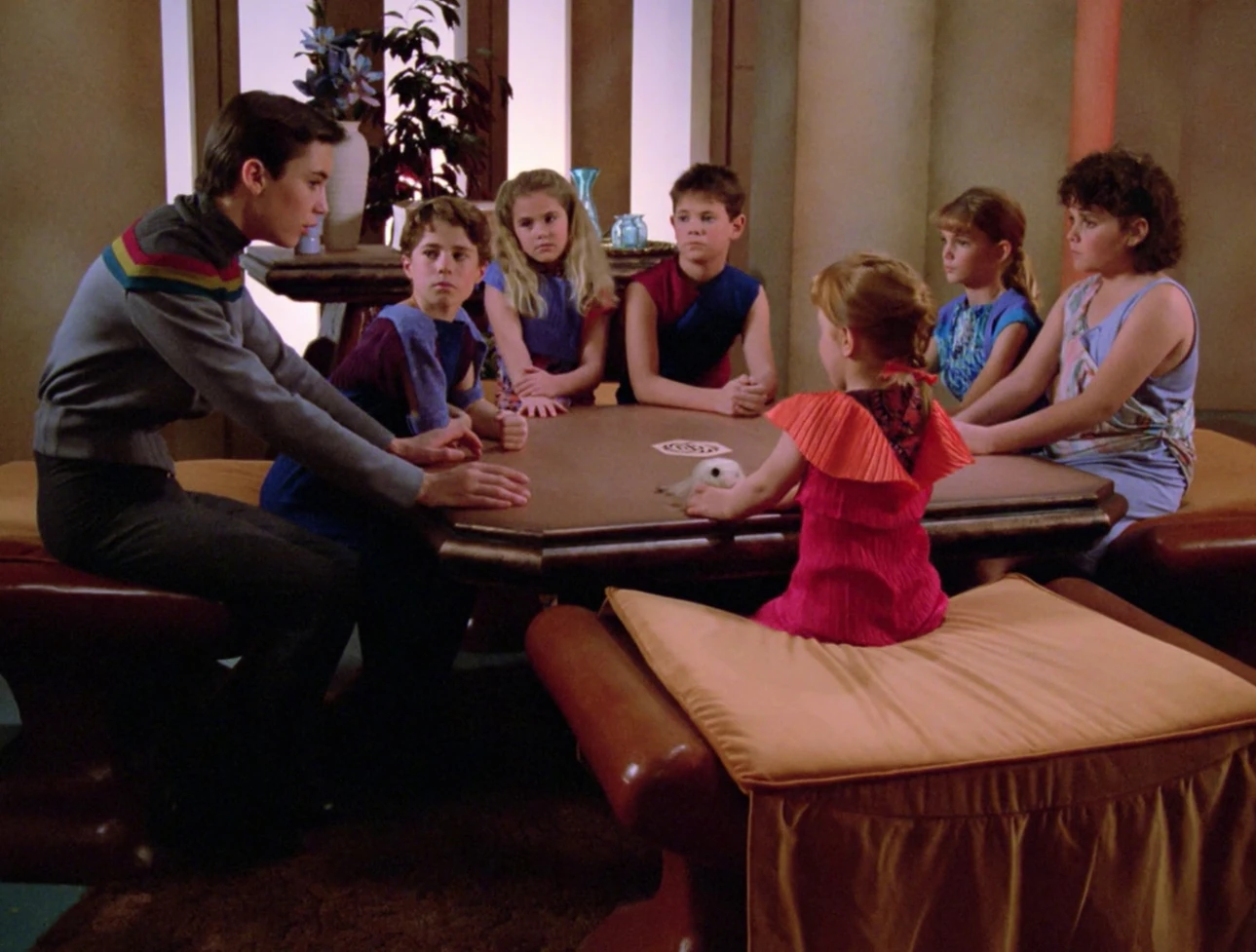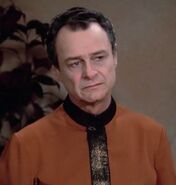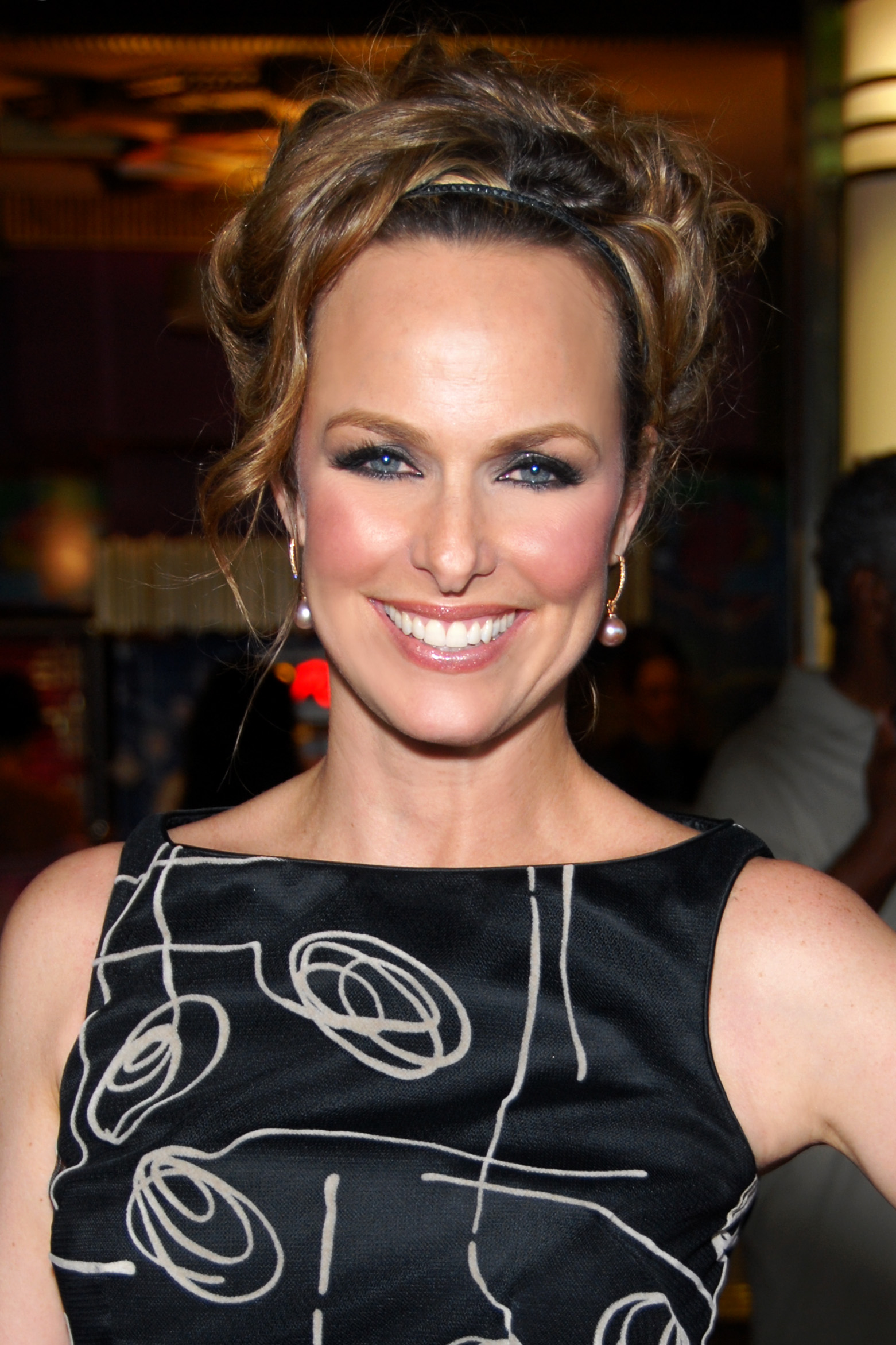Series: Star Trek: The Next Generation
Season 1, Episode 17
Original Air Date: February 15, 1988
 |
| via Memory Alpha |
Our heroes visit the legendary world of Aldea, likened to Earth's Atlantis. The natives seem hospitable until they kidnap children from the Enterprise. Their own population has gone sterile so they require new blood in order to survive.
It's Star Trek with a story about children, generally not a winning combination. If you're going to cast children, you'd better give them good material or they will appear wooden. "Bough Breaks" doesn't work. Don't go blaming Wesley, either. Wil Wheaton does the best he can with what he's been given. The writing stinks. Not his fault.
The material for the adults isn't much better. The story's resolution is way too simplistic. Nice to see Brenda Strong, though, in the role of Rashella. I always appreciate seeing Sports Night people getting work, even before the series! Wheaton's younger brother and sister also appear in un-credited, non-speaking roles.
There is an interesting musical moment. The instrument Katie (Jandie Swanson) plays with Melian (Paul Lambert) is highly reminiscent of that used by the Mule in Asimov's Foundation series. The idea of thinking the music rather than physically manipulating the instrument is similar.
Jerry Hardin plays the role of Radue, leader of the Aldeans. He was born November 20, 1929 in Dallas, Texas. He attended Southwestern University before heading to study at London's Royal Academy of Dramatic Arts.
Hardin has many credits on stage, film and television. His biggest job was as the recurring character Deep Throat in the X-Files series. He appeared in eleven episodes over a seven-season stretch. While he did his best to discourage his children from entering the profession, his daughter Melora has had a long career in television.
The material for the adults isn't much better. The story's resolution is way too simplistic. Nice to see Brenda Strong, though, in the role of Rashella. I always appreciate seeing Sports Night people getting work, even before the series! Wheaton's younger brother and sister also appear in un-credited, non-speaking roles.
There is an interesting musical moment. The instrument Katie (Jandie Swanson) plays with Melian (Paul Lambert) is highly reminiscent of that used by the Mule in Asimov's Foundation series. The idea of thinking the music rather than physically manipulating the instrument is similar.
Acting Notes
 |
| via Memory Alpha |
Jerry Hardin plays the role of Radue, leader of the Aldeans. He was born November 20, 1929 in Dallas, Texas. He attended Southwestern University before heading to study at London's Royal Academy of Dramatic Arts.
Hardin has many credits on stage, film and television. His biggest job was as the recurring character Deep Throat in the X-Files series. He appeared in eleven episodes over a seven-season stretch. While he did his best to discourage his children from entering the profession, his daughter Melora has had a long career in television.
 |
| via Wikipedia |
I should finally watch it☺
ReplyDeleteMaybe. Don't start with this one. I'm sure your sister could give you a best episodes list to explore. I'd start with "Encounter at Farpoint," the pilot, but then meander after that.
DeleteYou have it, right there. It was a disturbing show.
ReplyDeleteYeah. Just never quite feels right to me.
DeleteI actually really like this one, and the kids are all right, including Wes in perhaps his first decent outing. The title of the episode, even when I eventually figured out that it came from the nursery rhyme, always stood out for me, as one of the better examples of the later Treks following in the naming scheme of the original series.
ReplyDeleteTo each one's own. I agree it's not bad as a Wesley effort as Wesley efforts go. But that's a low bar.
DeleteThe title is definitely clever.
Another one I don't remember.
ReplyDeleteDefinitely skip it.
DeleteYeah, I felt the writing in this one was quite bad. That being said, every time I watched the episode I felt that the writers did have an interesting plot.
ReplyDeleteI know it will never happen, but it would be interesting to see a real science fiction writer rework this idea.
Star Trek is filled with those: great ideas that don't quite work. The animated series, especially, has a lot of strong story elements in otherwise weak plots.
DeleteHere, going all in on the kids was a mistake without the writing to back it up. But there are moments that exhibit potential: Beverly's parental/professional struggle, the attachment between Rashella and Alexandra, even the leadership opportunity for Wes. And then they drop the ball with the ending - way too tidy for what would in reality be a highly tense, emotional situation.
I only watched the first generation of Star Trek, but that's not why I'm commenting. In today's "Writer's Almanac," one of the authors whose birthday today is Bernard DeVoto (as a Western historian, I know of him and have read a number of his book). I did not know that DeVoto wrote a rather opinionated book about cocktails. I am copying this from today's post as I thought you might like it:
ReplyDeleteHis book The Hour: A Cocktail Manifesto (1948) was reissued in 2010. In it, he described a Manhattan as “an offense against piety,” a daiquiri as “a regressive fantasy,” and mixed drinks with fruit juices as “all pestilential, all gangrenous, and all vile.” He wrote: “The proper union of gin and vermouth is a great and sudden glory; it is one of the happiest marriages on earth, and one of the shortest lived.”
www.thepulpitandthepen.com
That is marvelous! I guess he was partial to martinis? And it is highly fitting that my own favorite would be deemed as sacrilegious.
ReplyDeleteThanks for sharing, Rev.
Yeah, that wasn't a good one.
ReplyDeleteNope.
DeleteThat idea about thinking music is a powerful one from Foundation and used to good effect in this episode. Not the best one but worth watching.
ReplyDeleteFirst of all, great to hear from you, Maurice! Always delighted when you chime in and especially re: Trek.
DeleteWorth watching... it's an interesting consideration with Star Trek. Even at its best, Trek is uneven from week to week. And yet, there are often little gifts here and there even with the doozies. It's all part of the whole and the whole is one of the most amazing enterprises (pun intended) in the history of television. 54 years and counting and stronger than ever!
And yet, there is so much available to watch these days that a thoughtful sampling may be a better use of time than a full-on binge. I'm thinking about M*A*S*H for my daughter at the moment. 13 seasons is a lot to plow through and not all of the episodes are exactly gems. But the best are amazing. A more thoughtful binge is in order.
But with Trek, I'll take it all! But my recommendations to others are more selective.